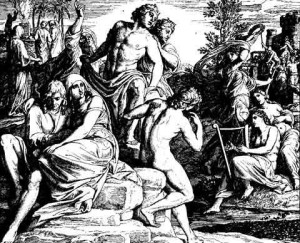Anyone who reads Genesis 6 will ask themselves the question, “Who are these  ‘sons of God’?” Most English translations of the Bible simply translate the Hebrew as “sons of God,” but some translations add to the confusion by not only translating the Hebrew, but also interpreting the Hebrew in their translations. Consider the following translations of Genesis 6:1-4.
‘sons of God’?” Most English translations of the Bible simply translate the Hebrew as “sons of God,” but some translations add to the confusion by not only translating the Hebrew, but also interpreting the Hebrew in their translations. Consider the following translations of Genesis 6:1-4.
English Standard Version (ESV)
1 When man began to multiply on the face of the land and daughters were born to them, 2 the sons of God saw that the daughters of man were attractive. And they took as their wives any they chose. 3 Then the LORD said, “My Spirit shall not abide in man forever, for he is flesh: his days shall be 120 years.” 4 The Nephilim were on the earth in those days, and also afterward, when the sons of God came in to the daughters of man and they bore children to them. These were the mighty men who were of old, the men of renown.
Contemporary English Version (CEV)
1-2 More and more people were born, until finally they spread all over the earth. Some of their daughters were so beautiful that supernatural beings came down and married the ones they wanted. 3 Then the Lord said, “I won’t let my life-giving breath remain in anyone forever. No one will live for more than one hundred twenty years.” 4 The children of the supernatural beings who had married these women became famous heroes and warriors. They were called Nephilim and lived on the earth at that time and even later.
The ESV and the CEV use different methods of translation. The ESV falls into the formal equivalence camp and the CEV falls into the dynamic (or functional) equivalence camp. (For more on the difference between formal equivalence and dynamic equivalence see here.)
A close look at these two translations lets the reader immediately see the issue. Are the “sons of God” (ESV) really “supernatural beings” (CEV)? So who are these “sons of God”?
According to John Sailhamer, who is a recognized expert on the Pentateuch (the first five books of the Old Testament, which includes Genesis), the “sons of God” have been understood three different ways historically.
First, the “sons of God” could be angels. This view is not widely held since it appears to contradict Jesus’ own words that angels do not marry (see Matthew 22:30). Second, the sons of God” could be royalty. Or, third, the “sons of God” could be pious men from the line of Seth.
But Sailhamer writes,
All such interpretations, however, originate from the assumption that vv. 1-4 are an introduction to the account of the Flood and are therefore to be understood as the cause of the Flood. If, on the other hand, we read vv. 1-4 as the summary of chapter 5, there is little to arouse our suspicion that the events recounted are anything out of the ordinary. As a summary of the preceding chapter, this little narrative is a reminder that the sons and daughters of Adam had greatly increased in number, had married, and had continued to have children. The impression it gives is that of an interlude, a calm before the storm.
[John Sailhamer, Expositor’s Bible Commentary, volume 2, 76.]
So, these “sons of God” are not “supernatural beings.” They are the extraordinary men (i.e., the men of renown) who lived from the time of Adam until the time of the Flood.
For His Glory,
Pastor Brian